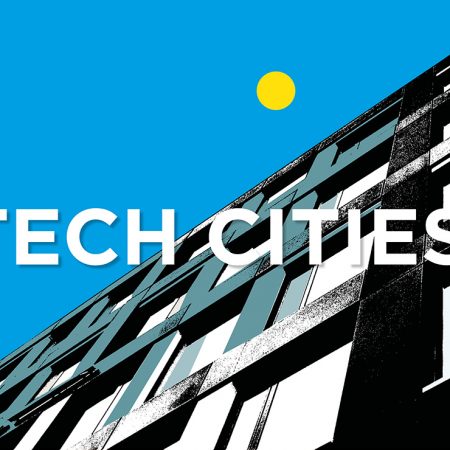Climate change, the world’s most pressing challenge, is driving huge investment into technologies that can help mitigate its effects. The two key areas of research and development here are CleanTech and ClimateTech.
Whereas ClimateTech is focused on reducing CO2 emissions, CleanTech has a wider environmental remit.
The businesses behind them tend to congregate in certain cities, drawn in by tech-friendly conditions. But what are they?
Savills Tech Cities CleanTech and ClimateTech Index
Source: Savills Research. Tech sector verticals: CleanTech & ClimateTech
Follow the money
Funding is, of course, the lifeblood of most start-ups and early-stage businesses – and CleanTech and ClimateTech are no exceptions. Data shows that the two sub-sectors have attracted higher than average venture capital (VC) funding since the signing of the Paris Agreement on climate change in 2016.
Whether that money comes from venture capitalists, government initiatives or co-operation between universities and the private sector, businesses will always be drawn to cities where funding is readily available and more plentiful.
The funding ecosystem is particularly important in smaller centres. In Denver, for example, which ranks 16th in the Savills Tech Cities CleanTech and ClimateTech index, a 0.25 per cent increase in sales tax for local government climate funding has been an important driver for climate projects more broadly. Charleston, meanwhile, (14th) is home to the Clemson University Restoration Institute, which has received an investment of $98M into wind turbine research from the Department of Energy.
ClimateTech drawn to university cities
A lack of profitable business models in the ClimateTech sector, due to scalability issues, means that smaller, university cities often take the lead in this area, shouldering the financial risks. Alongside Charleston and Denver, Hamburg (17th), Salt Lake City (18th), Cork (20th), Eindhoven (21st) and Cambridge in the UK (22nd) stand out.
Many of these cities are leading by example. In Salt Lake City, the Utah Climate Action Network – a partnership between the city, University of Utah, businesses, faith groups and non-profit organisations – sprung from the need to save Great Salt Lake, which is drying up, threatening the state’s agriculture industries.
In Eindhoven, government support is enabling low-income households to take part in the energy transition, while in Cork the government has worked with 3,000 citizens to measure nitrogen dioxide (NO2) pollution.
Better together: the benefits of clustering
However, funding is not the only criterion for a successful tech city. Boston, which tops the CleanTech and ClimateTech index, exemplifies the mix of attributes that makes a great tech city.
It has a strong business environment and ranks high for city buzz and wellness. Above all, with a high number of top-class universities that help promote R&D, it offers a superlative talent pool, especially of software engineers. Boston is also home to Greentown Labs, the largest climate-tech start-up incubator in North America.
This virtuous clustering of different factors is what really makes a centre shine. Take Cambridge in the UK, ranked 22nd in this index. Underpinned by its world-class university, Cambridge is a model of the triple helix of corporate, government and educational benefits that creates a compelling proposition.
Cambridge Cleantech, founded in 2011, is the UK’s leading clean-tech cluster, and the clean-tech sector in the Greater Cambridge region has a market value of £1.15 billion.
Cambridge also illustrates the value of political and popular buy-in to climate initiatives. The city is famously cycle friendly and its Climate Change Strategy aims to make it net zero by 2030.
A similar dynamic propels the clean-tech and climate-tech sectors in the Nordics, with Helsinki ranking sixth and Oslo seventh in the index. These cities benefit from high levels of investment in renewable energy and are leaders in sustainability. Norway, for example, has the highest electric vehicle penetration rate of any country in the world.
Sitting in 24th position in the CleanTech and ClimateTech index is Accra, showing the breadth of range of tech cities. The Ghanaian capital has a strong sector-specific score, but falls short on business environment.
New centres such as Accra can leapfrog more developed cities because they don’t have the same legacy issues. However, they have a lot of work to do to establish a strong business environment and compete for talent with more established centres on the city buzz and wellness criterion.
A greater impact
The Inflation Reduction Act in the US and the EU’s Green Deal Industrial Plan mean that massive new investment in CleanTech and ClimateTech is coming, and cities in these regions in particular will be well positioned to benefit.
These innovative tech sectors are changing city centres, too. In Nordic cities, a virtuous circle has emerged. Companies are attracted to them by the climate-friendly ecosystem. Their presence then reinforces that ecosystem, attracting like-minded people across a range of professions.
The city is more likely to turn to eco-conscious practitioners, for example, to enhance the built environment. Climate-friendly civic initiatives encourage pedestrianised areas and cycle-friendly transport systems, enhancing the quality of air – and life – for the city’s population as a whole. All of which makes the city still more attractive – not just to the CleanTech and ClimateTech companies, but to everyone.
Methodology:
Our 2023 Tech Cities ranking measure a city’s business environment, tech environment, city buzz & wellness, talent pool, and its strength and depth across different tech sub sectors:
*for each of the 11 Tech Sub sectors (AgTech & FoodTech, CleanTech & ClimateTech, Deep Tech, E-Commerce, FinTech, Industrial Tech, Life Sciences & HealthTech, MediaTech, MobilityTech, Software, SpaceTech). These are aggregated to form our overarching Tech Cities index.



